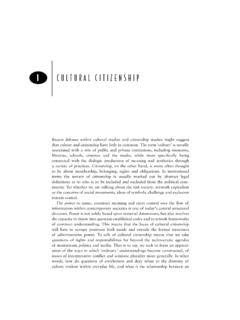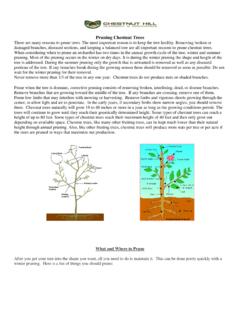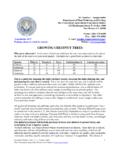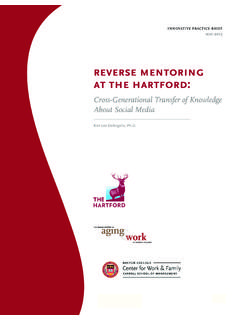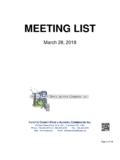Transcription of SOCIAL WORK SKILLS - mheducation.co.uk
1 SOCIAL WORK SKILLSA PRACTICE HANDBOOKP amela TrevithickOpen University PressBuckingham Philadelphia00 Prelim (jr/d) 30/10/00 3:47 pm Page iiiOpen University PressCeltic Court22 BallmoorBuckinghamMK18 1 XWemail: wide web: Chestnut StreetPhiladelphia, PA 19106, USAF irst Published 2000 Copyright Pamela Trevithick, 2000 All rights reserved. Except for the quotation of short passages for the purpose ofcriticism and review, no part of this publication may be reproduced, stored in aretrieval system, or transmitted, in any form or by any means, electronic, mechanical,photocopying, recording or otherwise, without the prior written permission of thepublisher or a licence from the Copyright Licensing Agency Limited. Details of suchlicences (for reprographic reproduction) may be obtained from the CopyrightLicensing Agency Ltd of 90 Tottenham Court Road, London, W1P catalogue record of this book is available from the British LibraryISBN0 335 20699 9 (pb)0 335 20700 6 (hb)Library of Congress Cataloging-in-Publication Data AvailableTypeset by Type Study, ScarboroughPrinted in Great Britain by Biddles Ltd, Guildford and King s Lynn00 Prelim (jr/d) 30/10/00 3:47 pm Page ivAcknowledgementsviiIntroduction11 Using theory and research to enhance practice92 Understanding human beings293 The importance of communication, listening and50assessment skills4 Basic interviewing skills695 Providing help, direction and guidance1146 Empowerment, negotiation and partnership skills1407 Professional competence and accountability162 Conclusion174 Appendix 1: Client-centred approaches177 Appendix 2: Cognitive-behavioural approaches179 Appendix 3.
2 Task-centred work182 Appendix 4: Crisis intervention184 Appendix 5: Psychoanalytic concepts186 Appendix 6: Twenty point interview preparation checklist188 Appendix 7: The challenge of partnership in child protection191 References193 Index206 CONTENTS00 Prelim (jr/d) 30/10/00 3:47 pm Page vThe suggestion that I write a book came several years ago when, quite unex-pectedly, I was approached by a stranger after a talk I had given at a NationalAssociation for Mental Health (MIND) conference on women and mentalhealth. The stranger was Jo Campling, a well-known editor in the world ofsocial work publishing, to whom I owe special thanks. Without Jo s encour-agement, this text would not have been started nor found its way to JacintaEvans at Open University Press. I am grateful to Jo for so much, particularlyher gentle reminders to finish the text. I am also indebted to Jacinta for theskilful way she steered the text to publication, and for the thoughtfulness Ihave experienced from the staff at Open University Press.
3 In particular, Iwould like to thank Kate Tadman, Maureen Cox and Janet Howatson for theireditorial SKILLS and impressive attention to detail, and Clara Waissbein andTanya Sellars for their patience in addressing my queries. The comments Ireceived from the external reviewers, Joyce Lishman and Michael Preston-Shoot, were enormously valuable and helped make the text more am especially grateful to Michael for his detailed comments and encourage-ment, and for sharing his knowledge so generously. However, all errors greatest thanks go to my friends, Judy Carver and Robert French, with-out whom this work could not have been completed. Their belief in me, andthis text, has sustained me through dark, dismal days when nothing seemedpossible. The devoted way they ploughed through different chapters willremain with me always. I would also like to thank my son, Tom, for allowingme to disappear for hours on end without complaint, and Bridget for her helpat a crucial time.
4 Tom and Bridget have grown up with this book, and theirlove has been deeply sustaining. The support given by Charlie Beaton andDonald Branch over the years has been particularly important to me, especi-ally during the final weeks of writing. A special thanks goes to Jane Dennis forACKNOWLEDGEMENTS00 Prelim (jr/d) 30/10/00 3:47 pm Page viiher practical help and dependability, and Julie Selwyn for her inspiredcomments at a moment that would also like to thank other colleagues and friends who helped make thisbook possible including: Charlotte Ardizzone, Moira Bakehouse, RosemaryBaragwanath, Bill Beaumont, Chryselle Brown, Brian Caddick, Terrell Carver,Roger Clark, Mark Cox and his computer team (Paul Croft, Dave Hurst, DavidMidwinter, James Watson), Joy Dalton, Marie-Laure Davenport, Jon Doble,Rosemary Evelyn, Elaine Farmer, Eileen Gambrill, Maureen Hanscomb, MrsHarris, Mushroom Hamilton, Anna Harvey, James Hennefeld, Elaine Kreiger,Hilary Land, Jos Large, Tony Lewis, Kate Lyon, Geraldine Macdonald, GillMcGill, Rachel Mirress, Shailen Nandy, Jean Neumann, Phyllida Parsloe, RosePerrson, David Quinton, Rosie Tomlinson, Ann Shabbaz, Sue Pollock, JaneStacey, Chris Stephens, Peter Walker, Liz Wilson and Norma Wilson.
5 I owe aparticular thanks to the service users I have worked with over the years, whosestories continue to fuel in me a sense of outrage and an enduring belief in theimportance of fairness. Finally, I want to thank my students, particularly mytutees, for their comments on the SOCIAL work SKILLS unit I taught for nine years,on which this text is SOCIAL work skills00 Prelim (jr/d) 30/10/00 3:47 pm Page viiiThe context of SOCIAL work is changing rapidly. However, one fundamentalelement remains the same, namely that SOCIAL work is located within some ofthe most complex problems and perplexing areas of human experience, andfor this reason, SOCIAL work is, and has to be, a highly skilled activity. The pur-pose of this text is to describe this skilled activity by providing an account of50 SKILLS commonly used in SOCIAL work, and to identify how these SKILLS canbe used in practice to enhance our effectiveness and help bring about positiveoutcomes.
6 It attempts to bridge a gap that currently exists in relation to textswritten specifically on the theme of SOCIAL work SKILLS . This gap has also beennoted in relation to SKILLS teaching. According to research undertaken byMarsh and Triseliotis (1996), 51 per cent of students interviewed stated thatthere was too little SOCIAL work SKILLS training on their courses. In a list ofrecommendations, Marsh and Triseliotis conclude that much greater atten-tion [needs to be] paid to the teaching of SOCIAL work SKILLS using concrete prac-tice situations (1996: 219). This should include better and more appliedteaching of psychology (p. 220).In order to develop these SKILLS a toolbox of interventions we need tohave a sound theoretical and research base from which to begin to understandpeople and their situations, and to formulate plans of action appropriate tothe circumstances encountered. This involves understanding how experiencesare perceived, understood and communicated by people, and how thisimpacts on behaviour and life situations, both positive and negative.
7 To someextent, this understanding will always be incomplete and uneven because, inthe realm of human experience, life is unpredictable and some uncertaintyis inevitable (Marris 1996). Improving our practice SKILLS , based on currentresearch and the best evidence available, is a difficult task and one thatdaunts other professionals in this field, as this quotation from a report fromthe Cabinet Office notes:INTRODUCTION.. there are no easy remedies in SOCIAL work, especiallywhen we are confronted daily with oppression anddeprivation ..(Coulshed and Orme 1998: 3)01 Intro (jr/d) 30/10/00 3:48 pm Page 1 While there is plenty of research available in areas such as education, SOCIAL services and criminal justice, the coverage is patchy and there islittle consensus amongst the research community about the appropriate-ness of particular methodologies or how research evidence should be usedto inform policy and practice.
8 (Major 2000: 1)The complex nature of SOCIAL work is due, in part, to the fact that it involvesworking across differences of class, race, gender, age, disability, sexual orien-tation, religion, culture, health, geography, expectations and outlook on can be seen in the different ways that problems are presented,communicated and perceived by individuals and in terms of the solutionssought. There are also differences in the way other disciplines and professionsanalyse and work with is not always easy for people seeking help to state their needs or put wordsto their thoughts and feelings, particularly when these are tangled amid feel-ings of confusion, fear, humiliation, anger and despair. Then it can be hard forpeople to remember their strengths and abilities; the courage and determi-nation that have enabled them to get this far. Within this tangled mass ofjumbled experiences misunderstandings can easily occur, sometimes withtragic consequences, as the inquiries into the deaths of children known tosocial services attest (DHSS 1982; Gough 1993).
9 As practitioners we still havemore to learn about how to work with people in ways that are clear: ways thatshine a torch on what is happening and why, that illuminate possible ways tomove things forward and provide evidence of effectiveness or learning is an ongoing process and never complete. Indeed, one way toview every interaction is as a learning experience for both parties. As prac-titioners we may be learning how to pose questions in ways that offer thegreatest chance of being given open and honest responses. Or we may belearning to listen creatively to what is being said, or not said. At the same time,through the process of actually putting words to thoughts, feelings and experi-ences, service users may be ordering events and emotions, and learning moreabout their strengths and limitations, and their capacity to cope, or not, whenfaced with too much strain. They may be using this opportunity to come toterms with experiences that have been unbearable up to that point and, in thisdifficult process, may be learning how to trust again.
10 Other service users testour SKILLS in different ways, particularly those who have no interest in beinghelped , who are not motivated to change or who have a different value base(Trotter 1999: 1).This text emphasizes the central importance that communication and inter-viewing SKILLS play within SOCIAL work practice. As human beings we are, infact, always communicating something, although this may not be intelligibleto ourselves or to others. It may require some deciphering, which can belikened to learning a different language or, more precisely, a new dialect. Aspractitioners, to achieve an understanding about what is being communicated2 SOCIAL work skills01 Intro (jr/d) 30/10/00 3:48 pm Page 2means using everything at our disposal in order to come alongside the experi-ences of the people with whom we work. From this perspective I do not believethat it is possible to be an effective practitioner without being an effectivecommunicator.

